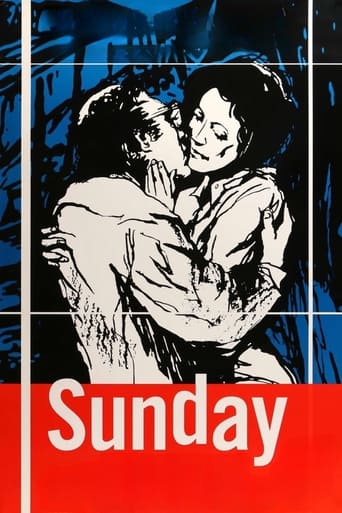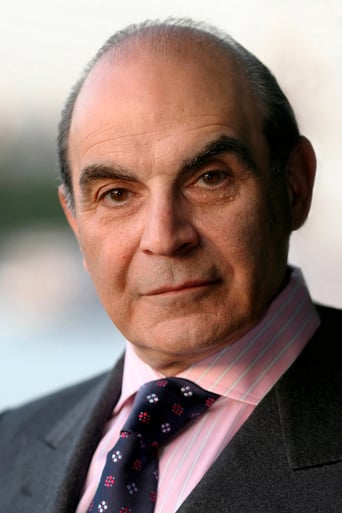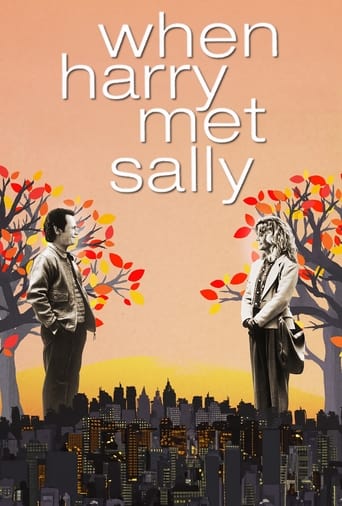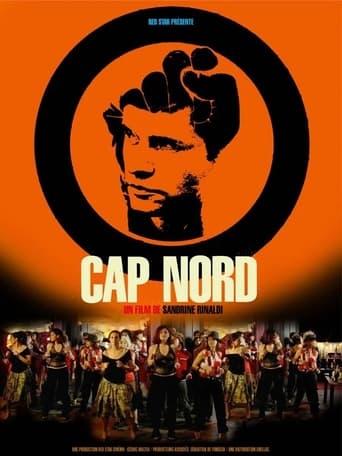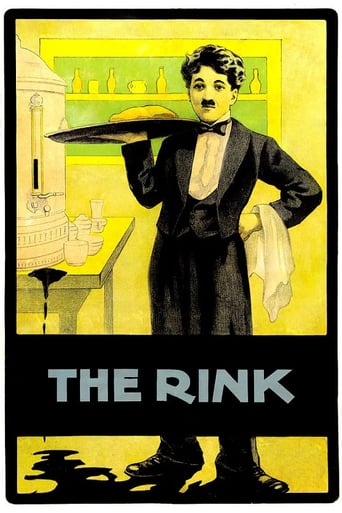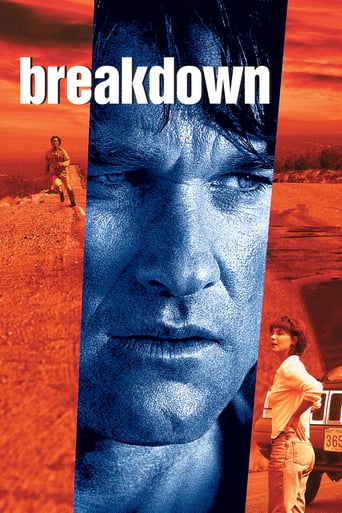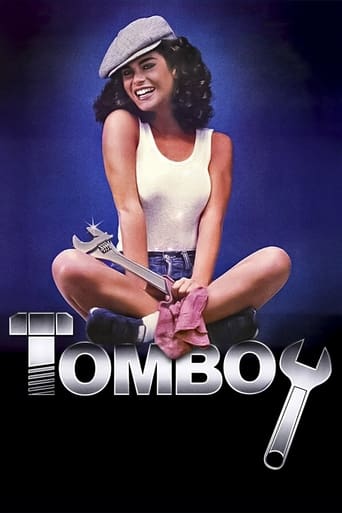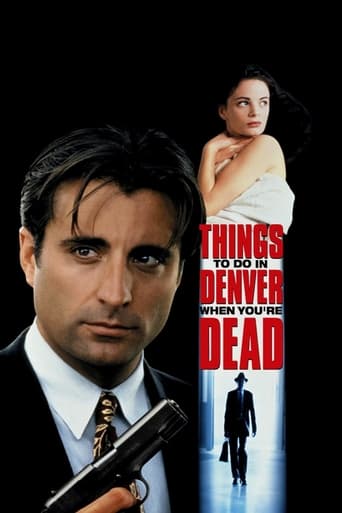Sunday (1997)
This film concerns two mysterious characters who meet on a Sunday in Queens. Madeleine the most unsettling creature of that name since "Vertigo" is a middle-aged, moderately successful actress. Oliver/Matthew is either a homeless man or a famous film director or both. Madeleine hails him on the street as the latter, launching a bizarre chain of events that includes a conversation in a diner, a very unromantic sexual encounter, the arrival of Madeleine's odd husband and unsuspecting daughter, and a child's birthday party. The film also compassionately tracks the daily rounds of Oliver/Matthew's fellow denizens of the homeless shelter, some of whom will be recognizable to New York audiences.
Watch Trailer
Free Trial Channels
Cast


Similar titles
Reviews
Admirable film.
The film may be flawed, but its message is not.
The thing I enjoyed most about the film is the fact that it doesn't shy away from being a super-sized-cliche;
It really made me laugh, but for some moments I was tearing up because I could relate so much.
Talking to a family friend about films he was after,I got told about an indie movie starring David Suchet. Checking on Amazon,I was surprised to find that it had only come out on DVD in France,which led to me watching it before the end of the week.The plot:Walking back home with a plant, former actress Madeleine Vesey spots a homeless man who looks just like film maker Matthew Delacorta. Believing him to be Delacorta, Vesey takes him for a bite at a diner. Attempting to talk about his work,Vesey finds Delacorta's memories to remain vague. Over the next few days "Delacorta" hints to Vesey that he is actually a different guy called Oliver,which leads to Vesey struggling to tell what is real and what is fiction with Oliver/Delacorta.View on the film:For a title shot in the US with two non-American leads using fake US accents and the film itself only being on DVD in France,co-writer (with James Lasdun)/director Jonathan Nossiter fittingly goes for a peculiar atmosphere,with the indoor scenes being shot in cramped camera angles that bring a tight closeness to Oliver/Delacorta and Vesey's relationship. Making his first non-documentary work, Nossiter retains the grit in his fiction debut via taking inspiration from the American New Wave and shooting on the streets of Queens New York.Subtly slipping in an ingenious twist ending,the screenplay by James Lasdun and Nossiter keep the dialogue wonderfully brittle,as Oliver / Matthew Delacorta vagueness over his identity allows Vesey to paint their relationship/ the "homeless man" into the corner that she sees fit. Bravely appearing naked in sex scenes, Lisa Harrow and David Suchet each give impeccable performances as Vesey and Oliver / Matthew Delacorta. Openly stating the pity she feels for him in front of his face,Harrow gives Vesey an expressive bohemian vibe,which strikes a fuse when Vesey learns left-field secrets about Oliver / Matthew Delacorta. Playing his real identity constantly in doubt, David Suchet shines in his timed exchanges with Vesey,and a fumble nature in revealing personal info at the end of the week.
I doubt many people will care about this review of a 20 year old movie. I've read over 30 previously posted reviews and the verdict seems pretty consistent. This is a unique, brave, sensitive project with two stellar performances at its center. There's a lot of ambiguity and confusion in the script, leading to quite a range of reviewer interpretations. Is he, isn't he? Can they, can't they? These two lost souls have the ability and opportunity to rescue each other as friends and lovers, but come the crunch seem to back away from it. They come tantalizingly close, but just can't make it happen. They're both too broken. She refuses to let him be who he is, even though he's risked everything to admit his identity. She just won't have any of it. When he wanders off into the lonely night at the end, you realize they aren't capable of more.Only two reviews I read here, both "professional," commented on the nudity. It is so refreshing to see un-self-conscious nude scenes by two middle aged actors. Lisa Harrow was a beautiful 54 year old woman when she made this film. Women everywhere, especially those who rail against the cult of youth, should applaud Ms. Harrow for her willingness to bare all for her art. One critic observed that her character seems more comfortable in her body than in her life.The documentary-like footage of a homeless shelter was my least favorite part of the film, but arguably it is necessary to establish the indignity to which David Suchet's life has fallen. All in all, this is a rewarding film. It's not a date movie (unless you want to get a real quick read on your partner). It's not a family movie. Are they still making indie films like this? If not, the loss is ours.
This movie is similar to 'The Player' and 'Adaptation', a movie within a movie, which most of the comments seem to miss. All of the comments on this movie seem to assume that 'Matthew' is really a homeless person. The last part of the movie, however, indicates that Oliver is really Matthew Delacorta. You hear his fellow mates at the shelter saying he had a wad of $20's. You see him tip the diner waiter generously. This man has money. His new movie is supposedly named 'Diversion'. He mentions the stars in the movie to be his fellow shelter bums. In the penultimate scene, what is popping out of the computer printer is an article on a movie 'Diversion' with a picture of someone who looks like Oliver.This explains the scene at the end, where he stares at her and she looks depressed, because she realizes he really is Delacorta and is not a homeless person she picked up. He really is staying at the shelter to soak up some atmosphere. Realizing their relationship was based on her fantasy, which no longer exists, he leaves. We assume that subsequently he makes the movie about that day and calls it Sunday. A nice twist to a well-acted flick.
I loved the beginning--the way you can't quite tell what the setting is, or who the main character is...the story is out of focus the way the world is to Oliver when he takes his glasses off.At the beginning, it stated somewhere that this film was based on a story called "Ate, Memos: the Miracle". All while watching it, I kept trying to figure out what the memos were. A lot of the film was in blue and orange. I wonder what those colors meant to the producer?When they were telling each other those stories, Oliver's was true but Madeleine didn't know it (although at first I thought she did)--and Madeleine made hers up, but Oliver thought she was telling the truth (and so did I!).That husband of hers was really scary. What was he trying to do? I didn't quite catch the story about the ex-husband and the couple in the shower, but it probably was supposed to connect with the scene where the plant was in the shower.That scene on the street when they run into the other men from the shelter was really weird--very spooky and unreal the way Oliver was suspended between them and Madeleine. Must have seemed that way to him, too. Lots of blue and orange there, too. When Oliver paid for their meals at the diner, I knew their relationship was doomed. How could he afford to keep up the pretense?What was the significance of those plants behind plastic in the bedroom? Did they represent Oliver? He was half dead (spiritually, anyhow), Madeleine brings him home and revives him, but doesn't really see him. It's like she's looking at him through not very clear plastic.Madeleine looked like Manet's Olympia, the way she was posed on the bed at the end.....I wish I knew what happened between Oliver's gazing at her there and ending up back on the street. Did she see that fax and realize that he was an imposter? Or did she know already and not care? Could he have told her the truth before he left? Was she using him, thinking of course that he was a producer? It didn't seem like a love story to me, just a couple of unhappy people who got caught in a time warp together.The saddest part was watching Oliver warming his hands on her radiator, knowing that he was going to be on the street all night in the cold, because it was past curfew. I wonder if that one day of being considered a "real" (read: not homeless) person was worth losing his place at the shelter. I expect Madaleine probably went back to England and Oliver managed to pull himself together, find some sort of a life.....but changed, of course!I really want to see it again and try to figure some of this out.

